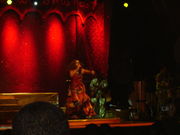Daniela Mercury
| Daniela Mercury | |
|---|---|
 Daniela Marcury at São João do Pelourinho in 2009. |
|
| Background information | |
| Birth name | Daniela Mercuri de Almeida |
| Also known as | Daniela Mercury |
| Born | July 28, 1965 |
| Origin | Salvador, Bahia, Brazil |
| Genres | Latin pop, Axé, Samba-reggae, MPB |
| Occupations | Singer, songwriter, record producer, dancer |
| Instruments | Vocals |
| Years active | 1989 – present |
| Labels | Estúdio Eldorado Epic Records BMG/MTV Sony Music EMI |
| Associated acts | Companhia Clic |
| Website | DanielaMercury.art.br |
Daniela Mercury (born Daniela Mercuri de Almeida on July 28, 1965), is a Latin Grammy Award-winning Brazilian axé, samba-reggae and MPB singer, songwriter and record producer. Since her breakthrough, Mercury has become one of the best known Brazilian female singers, selling over 20 million albums worldwide.[1] She is also the Brazilian female performer with most #1 hits in the country, with 14.
Contents |
Early life
Daniela Mercuri de Almeida was born on July 28, 1965, in the Portuguese Hospital in Salvador, Bahia.[2] Her mother is Liliana Mercuri, a social worker of Italian ancestry, and her father is António Fernando de Abreu Ferreira de Almeida, a Portuguese industrial mechanic. Mercury spent her childhood in a house in the Brotas neighborhood with her four siblings: Tom, Cristiana, Vânia (who would also become a singer) and Marcos.[3] A trouble-maker as a child, Mercury was nicknamed "drip-fire".[4] She attended both the Ana Néri School and the Colégio Baiano.[4]
When Mercury was eight years old, she began taking dance lessons.[4] At thirteen, influenced by the work of Elis Regina, she decided to become a singer.[5] At sixteen, she started to sing in trio elétricos. Two years later, she entered the Federal University of Bahia's Dance School.
Career
Early career (1984-1990)
From 1986 to 1988, Mercury was the lead singer for the band Cheiro de Amor.[6] In 1988 she started doing backing vocals for Gilberto Gil[5] and, shortly after, recorded her first two albums as the lead singer of band Companhia Clic.[6] Their songs "Pega que Oh!" and "Ilha das Bananas" became minor hits in Bahia radio stations. As the 1990s began, Mercury decided to pursue a solo career.[6]
Rise to fame (1991-1993)
Mercury's self-titled debut album was released in 1991 through independent record company Eldorado. The lead single of the album, "Swing da Cor", which features Olodum, became a number-one hit in Brazil,[6] and the album was soon known as Swing da Cor. Another song from the album, "Menino do Pelô", which also features Olodum, became Mercury's second top-ten hit in Brazil, charting at number four. On the following year, Mercury shut off from the record company and, ever since, produces her own albums to negotiate the distribution of them later with the labels that are interested.
In 1992, Mercury became an independent artist, which means she would start to produce her own albums and sell them to record companies (since then, she has founded a production company called Canto da Cidade and Páginas do Mar, a publishing house). That same year, O Canto da Cidade was released through Sony. The title track became a number-one hit in Brazil for months. The album gave Mercury the distinction of being the first singer to sell more than two million copies in Brazil[3]. The singles "Batuque", "O Mais Belo dos Belos" and "Você Não Entende Nada" all became number-one hits, while "Só pra te Mostrar", which features Herbert Vianna, was a top-ten hit.
Artistic development (1994-2000)
In 1994, Música de Rua was released through Sony. The album was received with lukewarm reviews, with some critics complaining about the similarities between this album and its predecessor. Nevertheless, the album was very well received by the public, selling more than one million copies and producing the hits "Música de Rua", "O Reggae e o Mar" (both number-one hits), "Por Amor ao Ilê" (a top-ten hit) and "A Rosa" (top-twenty). This was Mercury's first album to produce singles which have failed to chart.
In 1996, Feijão com Arroz was released through Sony. This album was much more well-received by the critics than its predecessor. It is Mercury's most well rated album at Allmusic, with four and a half stars. As of today, Feijão com Arroz is Mercury's second best selling album, behind only O Canto da Cidade. It produced the hits "À Primeira Vista", "Nobre Vagabundo", "Rapunzel" (all number-one hits), "Minas com Bahia" (which features Samuel Rosa from Skank and was a top-twenty hit) and "Feijão de Corda" (a top-ten hit).
In 1998, Mercury's first live album, Elétrica was released through Sony. It sold almost half a million copies and produced the top-ten hit "Trio Metal", which charted at number eight.
Experimentation with electronica (2000-2004)

In 2000, Mercury released her fifth studio album, Sol da Liberdade, through BMG. The album sold almost a million copies and produced two number-one singles ("Ilê Pérola Negra" and a cover of Antonio Marcus' "Como Vai Você"). The album, which was produced by Suba, was innovative in Mercury's career for its fusion with electronic music sounds.
The following year, Mercury released Sou de Qualquer Lugar through BMG. The album sold half of its predecessor, but was able to produce the number-one single "Mutante", a cover of Rita Lee. In this album, Mercury also experimented with electronic sounds.
In April 2003, Mercuy's second live album, Eletrodoméstico – MTV Live, was released through BMG. It was recorded in January 23 and 24 of that same year at the Castro Alves Theater in Salvador for MTV Brasil. It was also released in the DVD format, Mercury's first. Among the artists who performed with the singer were Dulce Pontes, Rosario Flores, Jovanotti, Carlinhos Brown and Olodum. The sales were very inferior to Mercury's previous and it only produced one top twenty hit ("Meu Plano").
In 2004, Carnaval Eletrônico was released through BMG. For the recording of this album, Mercury invited DJs and producers of electronic music in Brazil, as well as Gilberto Gil, Carlinhos Brown, and Lenine. It is a commemorative disc celebrating the five years of her having formed TrioTechno, the first trio elétrico of electronic music in Bahian Carnaval. The disc received a Latin Grammy nomination for best pop album of the year and Mercury was nominated for a TIM Award for best female pop/rock vocalist. Internet users voted Carnaval Eletrônico the best pop album of the year online in one of Brazil’s most important weekly magazines Revista Isto É.
Back to basics (2005-2007)
In 2005, Clássica was released through Som Livre on both CD and DVD. Recorded from a concert Mercury gave the year before at São Paulo's Casa de Espetáculo, the album is a sampler of bossa nova, jazz, and some of her biggest MPB hits. The record signaled a new phase for Mercury, who chose independence from record companies to gain full control of her work. Mercury was in London, during the July 7 bombings.[7]
That same year, Mercury's eighth studio album, Balé Mulato, was released, but through EMI. The album was very well received by the critics, with some even saying it was Mercury's best album since Feijão com Arroz (1996). It was not, however, very well received by the public, with none of the singles being able to chart on the top-ten; a large part due to lack of record company support. The next year, the Latin Grammy Award-winning live version of Balé Mulato, was released. Daniela Mercury has completed her newest release, Canibália. Canibalia was launched in October 2009.
Present
Daniela Mercury's last US performance, an open air free concert, on Sunday March 22, 2009 took place on Hollywood Beach, FL. As the headline act for 'Brazil on the Beach', she performed to the largest single-day crowd in Hollywood history. More than 65K attended the festival on Sunday alone, according to official estimates.

In July 13, 2007, Daniela Mercury closed the opening ceremony of the XV Pan American Games singing a medley of André Filho's "Cidade Maravilhosa" and Ary Barroso's "Aquarela do Brasil".[8]
In July 25, 2007, Mercury went to Buenos Aires to record a duet with Argentine singer Marcela Morelo. The song, titled "Ponermos de Acuerdo", will be featured in Morelo's first acoustic CD/DVD which is set to be released in the end of the year.[9]
An article published in the website of newspaper Folha de S. Paulo in August 15, 2007[10] erroneously referred to Mercury as being a member of the controversial Movimento Cívico pelo Direito dos Brasileiros (popularly known as Cansei). The newspaper later released an erratum note in August 23 stating that Mercury is not a member of the organization.[11]
Personal life
In 1984, at 19, Mercury got married to electronic engineer Zalther Portela Laborda Póvoas, her high school boyfriend.[12][4] The next year, on September 3, 1985, she gave birth to their first child, Gabriel (who is also a singer and songwriter). The following year, she gave birth to a girl named Giovanna (who is now a dancer in Mercury's ensemble). In 1996, Mercury and Póvoas divorced.[3] That same year, she was pointed by the sensationalist media as the reason for the split between Chico Buarque and Marieta Severo. In an interview to Istoé magazine, Mercury said that "it was a levity what they did, an irresponsibility that caused an uproar in my life and in the lives of both of them".[13]
In 2007, the gossip column "Retratos da Vida", of the Rio de Janeiro newspaper Extra, reported that Mercury was dating a New York City-based woman architect.[14] Mercury's press office said it would not comment about the singer's personal life. In July 2008, Mercury stirred up debate about her sexuality when she kissed fellow axé singer Alinne Rosa during the recording of a DVD for Rosa's band, Cheiro de Amor.[15] In 2009, however, Mercury married the Italian advertiser Marco Scabia, nine years her junior, in a private ceremony in Rome.[16]
Controversies
At late 2005, Mercury, a devout Catholic, was uninvited from a Christmas concert in the Vatican City due to her endorsement of a Ministry of Health campaign encouraging young people to use condoms.[17] Church officials feared she would use the occasion to promote the use of condoms.[18]
In 2006, Mercury openly opposed to Luiz Inácio Lula da Silva's reelection. This has drawn criticism from other artists, such as Zeca Baleiro, which accused her of being favored by the late Antônio Carlos Magalhães, a controversial oligarch from Bahia (what she denied vehemently). Later that same year, in an interview to Folha de S. Paulo, Mercury declared she was against reelections in general. She also said to have voted in Lula four times and that she was disappointed "by his first term (...), shocked with all these scandals". However, she said to hope that "Brazil will now have the four years of Lula that we hoped it would be in the first term."[19]
Philanthropy
Mercury has performed at a large number of charitable events. She is the second Brazilian honored as an ambassador for UNICEF (Renato Aragão was the first). She is also an ambassador for UNAIDS and UNESCO. She has performed at Rede Globo's annual charity Criança Esperança for fifteen consecutive years (1992–2007). She also represents various non-profit organizations including Caravana da Musica which has spawned her own Instituto Sol da Liberdade.
Discography
- See: Daniela Mercury discography
Videography
| Year | Video | Album |
|---|---|---|
| 1991 | "Swing da Cor" (featuring Olodum) | Daniela Mercury |
| 1992 | "O Canto da Cidade" | O Canto da Cidade |
| "O Mais Belo dos Belos" | ||
| "Batuque" | ||
| 1993 | "Você Não Entende Nada" | |
| "Só Pra te Mostrar" (featuring Herbert Vianna) | ||
| 1994 | "Música de Rua" | Música de Rua |
| "O Reggae e o Mar" | ||
| 1997 | "Nobre Vagabundo" | Feijão com Arroz |
| "Rapunzel" | ||
| "Feijão de Corda" | ||
| 1998 | "Trio Metal" | Elétrica - Ao Vivo |
| 2000 | "Ilê Pérola Negra" | Sol da Liberdade |
| "Santa Helena" | ||
| 2001 | "Beat Lamento" | Sou de Qualquer Lugar |
| 2002 | "Mutante" | |
| 2003 | "Dona da Banca" | MTV Ao Vivo - Eletrodoméstico |
| "Meu Plano" | ||
| 2004 | "Maimbê Dandá" (featuring Carlinhos Brown) | Carnaval Eletrônico |
| 2005 | "Aeromoça" | Clássica |
| "Sua Estupidez" | ||
| "Topo do Mundo" | Balé Mulato | |
| "Levada Brasileira" | ||
| 2006 | "Quero a Felicidade" (featuring Jammil e Uma Noites) | Balé Mulato - Ao Vivo |
| "Toneladas de Amor" | ||
| 2009 | "Oyá Por Nós" (featuring Margareth Menezes) | Canibália |
References
- ↑ Daniela Mercury on MSN Música
- ↑ Mercury, Daniela. (2008). Daniela Mercury: O Canto da Cidade - 15 Anos opening sequence. [DVD]. Sony BMG.
- ↑ 3.0 3.1 3.2 Daniela Mercury - Biography
- ↑ 4.0 4.1 4.2 4.3 [1]
- ↑ 5.0 5.1 Daniela Mercury biography in AllBrazilianMusic.com
- ↑ 6.0 6.1 6.2 6.3 Daniela Mercury on MPB Dictionary
- ↑ Folha Online - Ilustrada - Em Londres, Daniela Mercury relata horror das explosões - 07/07/2005
- ↑ Folha Online - Esporte - Público usa branco e mostra patriotismo em abertura do Pan - 13/07/2007
- ↑ Folha Online - Ilustrada - Daniela Mercury participa de novo trabalho da argentina Marcela Morelo - 26/07/2007
- ↑ Folha Online - Brasil - D. Odilo diz desconhecer ato do "Cansei" na Catedral da Sé - 15/08/2007
- ↑ Folha Online - Brasil - Erramos: D. Odilo diz desconhecer ato do "Cansei" na Catedral da Sé - 23/08/2007
- ↑ Dictionary Cravo Albin of the Brazilian Popular Music
- ↑ [2]
- ↑ [3]
- ↑ [4]
- ↑ []http://blogs.abril.com.br/ego-famosos/2009/05/daniela-mercury-se-uniu-ao-publicitario-marco-scabia-em-cerimonia-na-casa-sogra-em-roma.html]
- ↑ "Vatican cancels singer for "pro-condom" statement"
- ↑ "Daniela Mercury dropped from the Vatican's annual Christmas concert"
- ↑ [5]